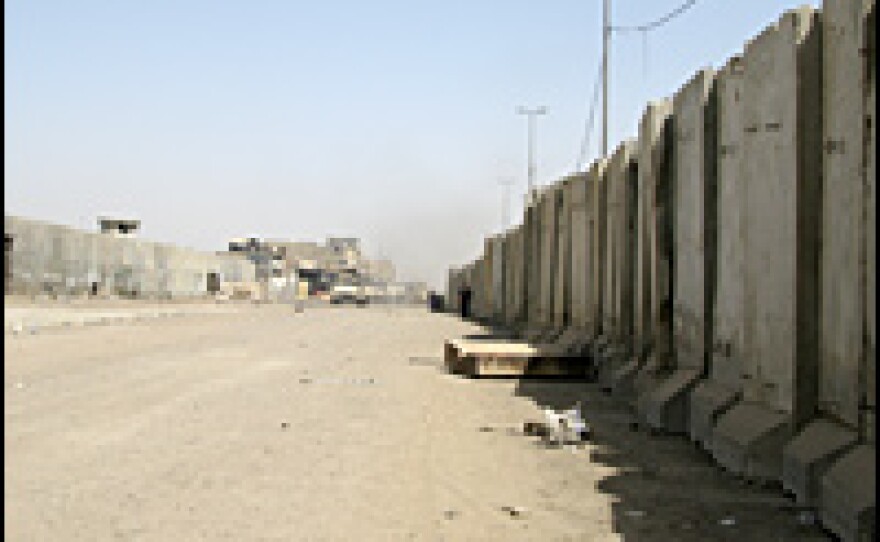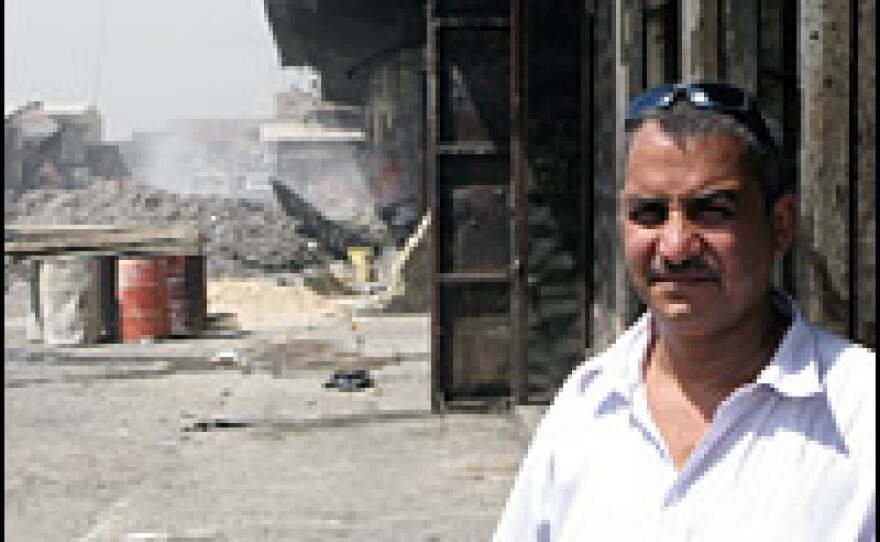

After two months of fierce fighting, U.S. and Iraqi forces have imposed relative calm on the Baghdad neighborhood known as Sadr City. But the battle brought devastation to the economic heart of the area, a vast wholesale market that supplied goods to merchants all over Iraq.
Whole blocks of shops and warehouses in the Jamiila market were burned and blasted during the fighting to oust the Mahdi Army militia, which is loyal to Shiite cleric Muqtada al-Sadr and had controlled Sadr City since the start of the war.
Sadiq Saleem, a factory owner and dealer in electrical parts, says the fighting destroyed about 200 stores and 20 factories, putting more than 5,000 people out of work. He and other wholesalers in the market want financial compensation for their losses. They say they need government action to restore the streets and build basic infrastructure, such as water, sewer and electric lines.
So far, the 40-year-old trader says he has filed claims with both U.S. and Iraqi authorities, but seen no action.
The stakes are high — not just for the merchants, but for business almost everywhere in Iraq. Before the fighting, 18-wheelers from Syria, Turkey and Iran rolled into the market with cargo ranging from car parts to fresh produce.
The market supplied retailers from all over Baghdad and neighboring cities. The U.S. officer in charge of reconstruction, Brig. Gen. Jeffrey Talley, says the market also provided jobs for 30 percent of the 2.5 million residents of Sadr City, one of Baghdad's poorest neighborhoods.
Merchants from the market say it is essential that they get compensation for their losses as quickly as possible because of the way their business is structured. Most wholesalers obtain their goods on credit and pay their suppliers when the goods are sold.
Najya Salah Atteya, a 48-year-old widow, says she owes tens of thousands of dollars for the goods that were destroyed in her two stores, outlets for cheap, Chinese-made toys.
She says she has no cash and can't hope to restart her business until those debts are paid. Atteya says she filed a claim for compensation with Iraqi officials about a month ago, but has heard nothing.
Lt. Col. Steven Stover, a U.S. military spokesman, says that so far, about 1,300 people have come to discuss the possibility of compensation, and more than 550 claims have actually been filed with U.S. authorities. Stover stresses that the U.S. places the blame for the damage squarely on the militia fighters, but says American forces want to help in the recovery.
Even if they get the money to rebuild, Jamiila's traders face another problem. In order to keep Mahdi Army fighters out of the market, the U.S. Army enclosed Jamiila in a three-mile, 12-foot-high security wall built out of concrete segments, similar to gigantic versions of the traffic barriers on U.S. highways.
Ehsan Mazher Lafta, a produce wholesaler, says there are only two entrances to the market through that wall and that cars and trucks often have to wait for hours to get through the Iraqi Army checkpoints. He says the difficulty of transporting construction materials to his site will double the cost of rebuilding his business.
The 42-year-old trader also fears the wall will keep out customers. "It will take them longer to get here and cost more, so they'll take their business somewhere else. This wall has destroyed us," Lafta says.
Iraqi military officials say they plan to open four more entrances in the coming weeks, two for vehicles and two for pedestrians.
In the meantime, a few children have found their way into Jamiila market through their own secret entrance. It consists of a pair of child-sized holes blasted into the barrier by artillery fire.
Muntathar Ibrahim, 18, says he nearly gave up, but walked until he found a hole he could slip through. Jamiila market was once a lucrative place to scavenge for soda cans that can be sold for scrap. Now, the wreckage of businesses offers him a chance to find twisted metal of all kinds.
Copyright 2022 NPR. To see more, visit https://www.npr.org. 9(MDAzMjM2NDYzMDEyMzc1Njk5NjAxNzY3OQ001))






